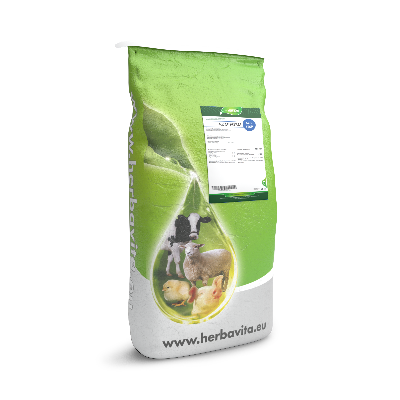Rumenal acidosis in cows
Do your cows suffer from ruminal acidosis? You can read all about ruminal acidosis in cows and what you can do about it here!
Rumenal acidosis occurs when the pH in the cow’s rumen drops below 5.6 for several hours. Because the environment in the rumen becomes too acidic, the rumen flora that is responsible for the breakdown of structure (fibre) dies or no longer functions properly. This reduced digestion will result in less feed intake and will have a negative impact on the cow’s milk production.
How does ruminal acidosis develop in cows?
.jpg) Ruminal acidosis is caused by a long-term excess of volatile fatty acids in the rumen. As these fatty acids provide the cow with 70% of its energy supply, they are extremely important. However, if the amount of fatty acids in the rumen exceeds the absorption capacity, the pH will decrease and ruminal acidosis will occur.
Ruminal acidosis is caused by a long-term excess of volatile fatty acids in the rumen. As these fatty acids provide the cow with 70% of its energy supply, they are extremely important. However, if the amount of fatty acids in the rumen exceeds the absorption capacity, the pH will decrease and ruminal acidosis will occur.
Rations with a high energy density and rapidly digestible carbohydrates or a lack of structure can also lead to ruminal acidosis.
In roughage with a high digestibility coefficient of organic matter (DCOM), more volatile fatty acids will be released into the rumen more quickly, which increases the risk of ruminal acidosis.
How do you recognise ruminal acidosis in cows?
Ruminal acidosis is diagnosed using a pH measurement of rumen fluid. Since this is a snapshot, the result is not always correct. For this reason, regularly tour the stable. The following can indicate the presence of ruminal acidosis in your animals:
.jpg)
- Many cows lie with the head in the flank
- Fewer than seven out of 10 resting cows are ruminating
- Lower activity of the rumen (normally one to two rumen contractions per minute)
- Ruminate less (<55) or more (>80). The target range is between 55-65 per ruminant chunk
- Reduced and irregular feed intake
- Too little rumen filling
- Reduction in milk fat content (the fat percentage is less than 3)
- The difference between fat and protein percentage is less than 1
- Thin manure or manure of varying consistency
- Laminitis
- Overall deterioration in the condition
- Dull hair coat
- Undigested feed residues in the manure
- Excessive drooling during rumination
How do you prevent ruminal acidosis in cows?
To prevent ruminal acidosis in cattle, it is important to keep the pH in the rumen as stable as possible. You can achieve this by:.jpg)
- Always make tasty food available. Avoid an empty feeder. Too much intake at once after temporarily going without feed causes excessive fluctuations.
- Put sufficient structure in the ration. During the rumination process, a lot of saliva is produced (150 l per day). This saliva contains sodium bicarbonate, among other things. Cows that ruminate well produce up to 1.5 kg of rumen buffer per day in this way.
- Preventing selection. Mix the ration well, but avoid grinding it too finely.
- Feed crushed grains that digest more slowly.
- Provide sufficient fresh water.
- Gradually get cows used to a new ration.
- Provide sufficient feeding space for each cow to avoid competition between cows. Overcrowding is detrimental.
- Add extra sodium bicarbonate and magnesium oxide to the ration.
Several studies in Europe show a prevalence of 10-20%. This means that 10-20% of your dairy cows may have ruminal acidosis. If you know that the cost of ruminal acidosis can easily rise to EUR 340 per case, without taking into account the cost of possible replacement and the vet, this is certainly a point for attention.
Discover the range from Herbavita to prevent ruminal acidosis. Our experienced advisers will be happy to visit you for customised advice. Click here to request a no-obligation information meeting.

